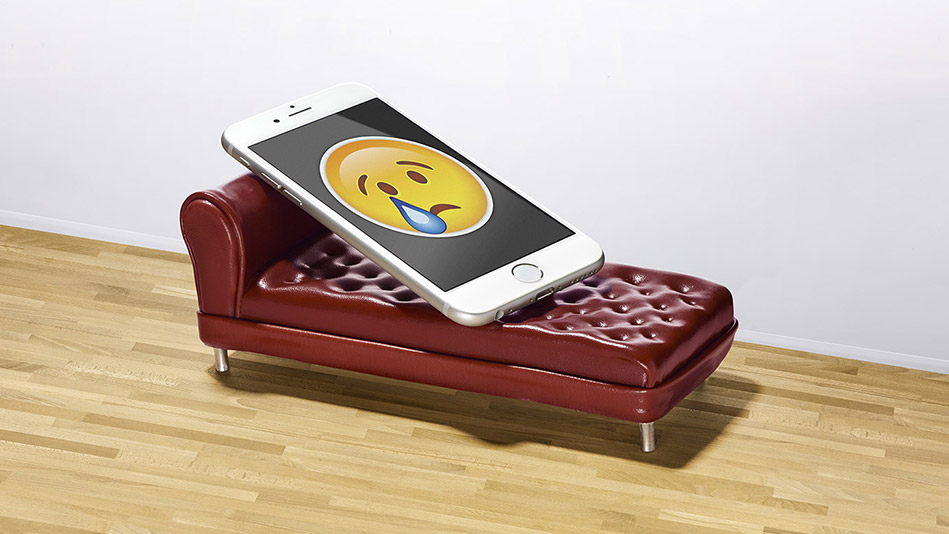Do Therapy Apps Really Work?
Experts debate whether online therapy is helpful—or if technology has gone too far.

Photo: The Voorhes
In an age when you can take care of almost any business on your phone (order dinner! hail a cab! book a handyman!), it's no surprise that there's an app for therapy, too. New text therapy services, like Talkspace and BetterHelp, allow you to message a licensed mental health professional whenever you please. We asked two experts to weigh in on the pros and cons.
Worth a Try!
The Expert: George Nitzburg, PhD, adjunct assistant professor at Columbia University's Teachers College, who researches the intersection of tech and psychology.
"Traditional face-to-face therapy is the gold standard, but it's too inaccessible. According to one study, only about 40 percent of people with serious mental health disorders receive treatment. There are many reasons for this, starting with logistical hurdles—arranging childcare, getting time off work, fighting traffic. For people in rural parts of the country, it can be hard even to find a local provider. Then there are the emotional barriers. If you're depressed, you may have trouble getting off the couch, let alone making it to a therapist's office. There's also still a degree of stigma around seeing a therapist. Simply put, text therapy services make it easier to reach out for help. And they're cheaper. Individuals suffering with mental illness often have financial difficulties because symptoms can affect their ability to work. Many psychotherapists offer low-fee services when they can, but these apps can reduce costs more broadly. While text therapy may not be right for those with more severe psychiatric disorders, it can help people get around many of the barriers that keep them from getting treatment at all."
Not So Fast...
The Expert: Lynn Bufka, PhD, licensed psychologist and associate executive director of practice research and policy at the American Psychological Association.
"I have many concerns about text-based therapy. There isn't enough research to support it as a sole method of treatment, whereas the benefits of in-person psychotherapy have been well documented for decades. As a clinician, I would miss out on so many nonverbal cues if I didn't see a client face-to-face, tears welling up in her eyes or the way her body tenses when she talks about a specific subject. People can too easily hide their emotions through text, which would make it harder for me to do my job. Another concern is that text therapy can leave the patient in a vulnerable position. Read the fine print, and you'll see that some text therapy providers have a disclaimer absolving them of responsibility if you run into trouble. For example, if the therapist violates doctor-patient confidentiality or engages in an inappropriate relationship with you, you may not be protected. And while these companies say they work with licensed therapists, the truth is, it's harder to verify their credentials. If you can't find a professional in your area, try video- or phone-based therapy. Both have proven benefits."
Worth a Try!
The Expert: George Nitzburg, PhD, adjunct assistant professor at Columbia University's Teachers College, who researches the intersection of tech and psychology.
"Traditional face-to-face therapy is the gold standard, but it's too inaccessible. According to one study, only about 40 percent of people with serious mental health disorders receive treatment. There are many reasons for this, starting with logistical hurdles—arranging childcare, getting time off work, fighting traffic. For people in rural parts of the country, it can be hard even to find a local provider. Then there are the emotional barriers. If you're depressed, you may have trouble getting off the couch, let alone making it to a therapist's office. There's also still a degree of stigma around seeing a therapist. Simply put, text therapy services make it easier to reach out for help. And they're cheaper. Individuals suffering with mental illness often have financial difficulties because symptoms can affect their ability to work. Many psychotherapists offer low-fee services when they can, but these apps can reduce costs more broadly. While text therapy may not be right for those with more severe psychiatric disorders, it can help people get around many of the barriers that keep them from getting treatment at all."
Not So Fast...
The Expert: Lynn Bufka, PhD, licensed psychologist and associate executive director of practice research and policy at the American Psychological Association.
"I have many concerns about text-based therapy. There isn't enough research to support it as a sole method of treatment, whereas the benefits of in-person psychotherapy have been well documented for decades. As a clinician, I would miss out on so many nonverbal cues if I didn't see a client face-to-face, tears welling up in her eyes or the way her body tenses when she talks about a specific subject. People can too easily hide their emotions through text, which would make it harder for me to do my job. Another concern is that text therapy can leave the patient in a vulnerable position. Read the fine print, and you'll see that some text therapy providers have a disclaimer absolving them of responsibility if you run into trouble. For example, if the therapist violates doctor-patient confidentiality or engages in an inappropriate relationship with you, you may not be protected. And while these companies say they work with licensed therapists, the truth is, it's harder to verify their credentials. If you can't find a professional in your area, try video- or phone-based therapy. Both have proven benefits."



